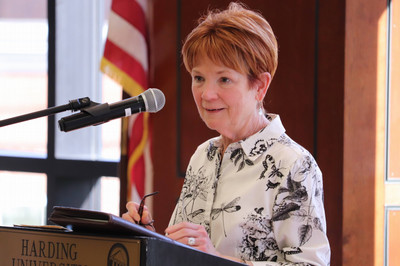
by Alyssa Dodson, student writer
Arkansas Poet Laureate Suzanne Underwood Rhodes visited campus March 18, 2025, for a public reading and conversation with our poetry classes. English major Alyssa Dodson shared this reflection on that visit and the power of poetry in her own life.
What struck me most about our most recent visiting writer was how refreshingly normal she seemed. I had expected a different presence from the poet laureate of the state, but Suzanne Rhodes felt like a person I would be friends with, someone I would chat with at church or take a class from at school. I anticipated a level of stuffiness that was graciously absent from her demeanor and her words. She had the kind of energy that makes you want to sit down for a cup of tea and talk about the troubles of life with a smile, recognizing the beautiful triviality and magnitude of all the massive and mundane experiences of being human. She interacted with our class with such an ease yet still spoke with such a delicacy and power of thought that I found myself inspired just by listening, both to her thoughts and to the elegance with which she strung them together.
I was moved, not only by the power of her poetry or the grace of her approach, but also by her work with incarcerated women and dementia patients. I remember delving into the research surrounding music and Alzheimer’s when I read James Baldwin’s short story “Sonny’s Blues” for the first time; Rhodes’ similar application of poetry for those affected by dementia and corrupt power systems made me want to cry — but in a beautiful way. Words have always been my own song in so many ways, and hearing about the power they have on some of our most vulnerable populations and the care put into providing that power, is enough to make me feel simultaneously more a part of humanity and more persuaded to find my own ways to make a difference in the world.
I wrote down several quotes during Rhodes’s conversation with our class, but I think my favorite was when she was asked how she turned the pain of her husband’s death into art. Almost without missing a beat, she responded, as if it were the most obvious yet evasive truth: “It was all I could do.” In the face of tragedy, what else is there? It reminded me of the lines from Bertolt Brecht’s “Motto”:
“In the dark times
Will there also be singing?
Yes, there will also be singing.
About the dark times.”
A friend recently asked me, while struggling with her own self-worth, “But why do you love me?” She felt as if being loved was something she didn’t deserve, and she couldn’t see why anyone, especially those who know her best, would love her. I found myself repeating Rhodes’ words to her: “it’s all I can do.”
I don’t know if the truth of my statement made a difference to the sinister vices of self-doubt, but I know, at least, that these words will help me approach so many aspects of my life with a mindset that allows me to more clearly express beauty and my own humanity to others. Sometimes there are moments where our responses — the best responses, often — are the only thing we can do, the only thing that makes sense, the only thing that fits. I think if we look at more of our lives and find ways to turn it into good, we can appreciate the value of our impact by considering that perhaps, it was the only thing we could do — the only way out and the only way through. In difficulty, too, we can give ourselves more grace, with the understanding that even if our actions were ones we can’t quite be proud of, it may just be that it was the only thing we could do. There is comfort in that it does not negate the space for learning and growth.